
How is AI Helping in the Healthcare Industry: Areas of Application
The healthcare industry is witnessing significant advancements in AI tools, particularly in the domains of work automation and data analysis. These innovations are proving highly effective in specific areas of health technology. According to Grand View Research, the global market for AI in healthcare is projected to experience a compound annual growth rate (CAGR) of 37.5% from 2023 to 2030. This growth is driven by several factors, including the exponential increase in digital health data, a growing demand for personalized medical interventions, and a heightened emphasis on reducing healthcare expenditures.
Automating Repetitive Tasks
AI in the healthcare sector plays a crucial role in streamlining and expediting repetitive and time-consuming tasks. This is particularly significant as healthcare professionals often face overwhelming workloads. Robotic process automation (RPA), a subset of AI, enhances human efficiency by automating tasks such as data entry and basic processing within the healthcare field.
According to Gartner, approximately half of healthcare providers in the US are expected to implement RPA in their facilities by the close of 2023. The RPA market in healthcare is forecasted to experience a Compound Annual Growth Rate (CAGR) of 26.01%, reaching USD 6.2 billion by 2030, a substantial increase from USD 2.9 billion in 2022. This highlights the significant market potential for automating repetitive tasks.
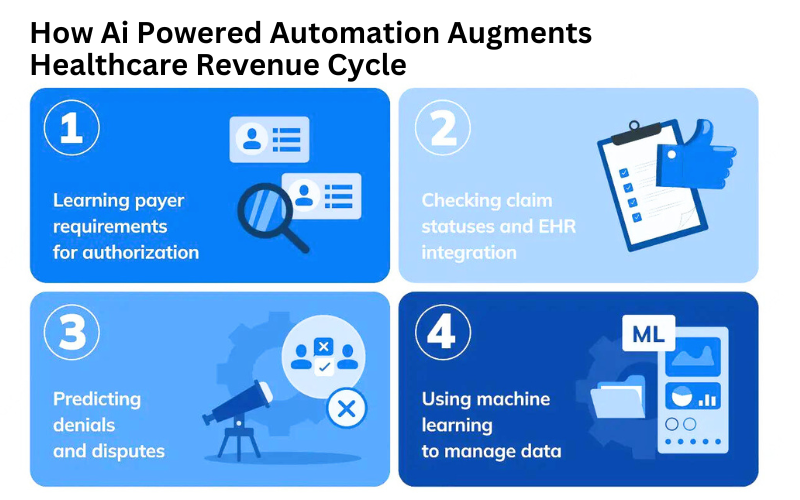
This automation not only accelerates reimbursement for healthcare providers but also minimizes the likelihood of mistakes. The company recently released a study on AI models and various potential applications in the healthcare sector.
RELATED: Why is Data Interoperability Vital for AI Adoption in Healthcare?
Diagnostics and Disease Detection
The emergence of AI diagnostics gained prominence during the pandemic, demonstrating remarkable efficiency in swiftly analyzing CT scans to distinguish COVID-19 cases from other ailments, achieving an accuracy of up to 90.8%. While the Alan Turing Institute Research suggests it didn't significantly impact pandemic response, this concept has spurred the emergence of numerous AI-focused startups dedicated to diagnostics and disease detection.
AI systems have the capability to utilize X-rays, MRIs, and CT scans to detect subtle discrepancies that may escape human observation, aiding doctors in earlier and more precise diagnoses. Furthermore, generative AI in the healthcare sector can scrutinize extensive datasets to uncover patterns and assist in forecasting diseases by identifying early warning signs and risks for clinicians.
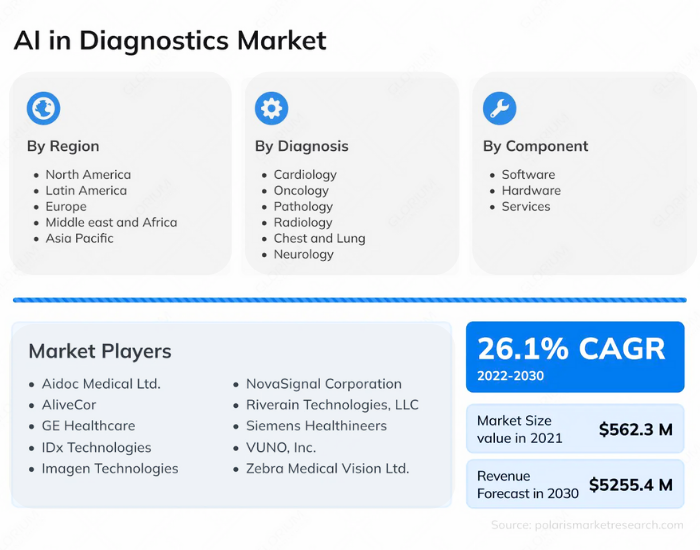
Use case: Startup IDx offers an AI-powered platform for diagnosing eye conditions. The company has a system that can identify signs of diabetic retinopathy in images of the retina. With their algorithms able to find diseases in different types of medical images, the company is creating platforms to diagnose macular degeneration, glaucoma, Alzheimer’s disease, cardiovascular disease, and stroke risk.
Speeding up Drug Discovery
Clinical trials for pharmaceuticals are enormously expensive, and only a small percentage of new drugs actually reach the market. The rising costs and the extensive research that demands thousands of hours from scientists are impeding progress in the drug development field. AI in healthcare is now utilizing algorithms to predict how drugs interact with the human body and process vast amounts of data at a pace and scale that would be impossible for humans. According to the IDTechEx report, this technology has reduced the timeline for drug discovery from over five years to a matter of months.
It's not surprising that startups focused on drug discovery are increasingly being acquired or entering partnerships with major pharmaceutical companies to validate their effectiveness. Sanofi, for instance, has signed a deal with Atomwise for $1.2 billion, while Pfizer has established partnerships with Truveta, Gero, CytoReason, and Tempus.
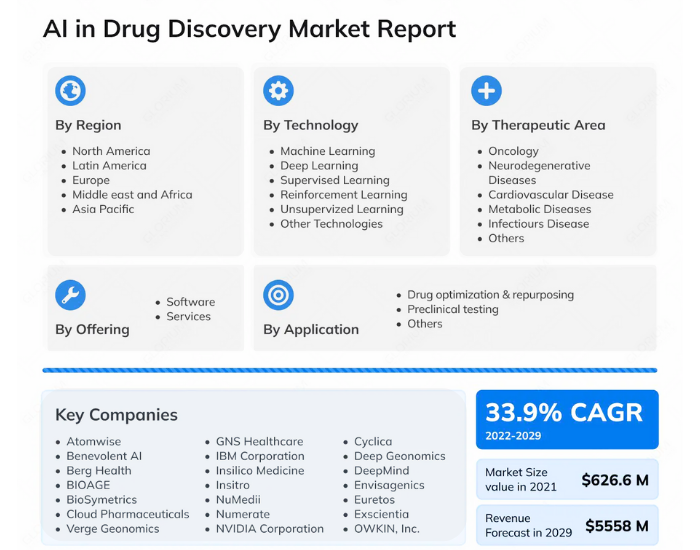
Use case: BenevolentAI employs artificial intelligence and data analysis to identify potential drugs and predict their effectiveness. They harness this technology to introduce innovative AI solutions, such as a natural language biomedical inquiry system. This tool is aimed at assisting biopharma collaborators like AstraZeneca in accelerating their research, optimizing data utilization, and maintaining a competitive edge in the industry.
Transforming Patient Experience
The integration of technology in healthcare simplifies the lives of patients, with AI playing a pivotal role. AI-driven virtual assistants and applications have become widespread, facilitating quicker and more convenient access to healthcare. Moreover, AI's involvement in the healthcare sector can lead to cost reduction by enhancing operational efficiency and productivity, ultimately resulting in more affordable services for patients.
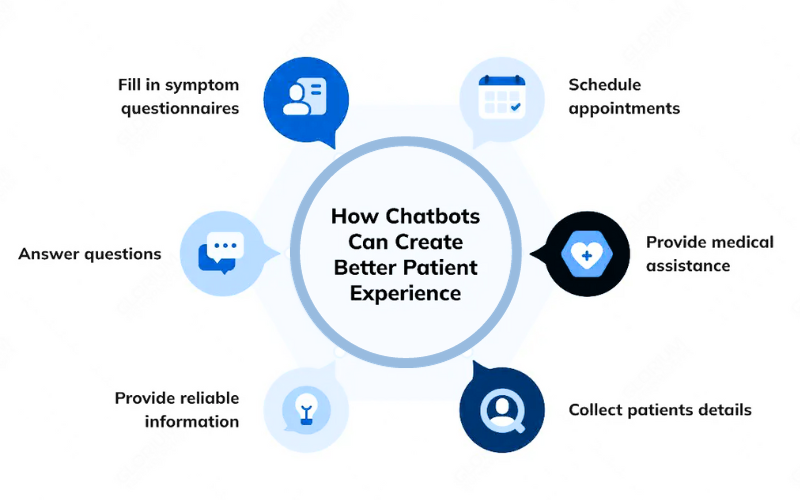
AI-augmented Surgical and Medical Devices
While the prospect of robot surgeons may still be in its early stages, the collaboration between AI and surgeons is already yielding promising results. Various branches of AI, including natural language processing, machine learning, and computer vision, are finding valuable applications in surgical procedures. Continued advancements in this field are anticipated to lead to improved patient outcomes in the near future.
In 2022, the global market for AI-enabled surgical robots was valued at $6.4 billion. According to Grand View Research, this market is expected to experience an annual growth rate of 18.9% from 2023 to 2030. As these devices become more efficient and as more doctors become proficient in their use, we can anticipate a greater number of individuals benefiting from them in the years ahead.
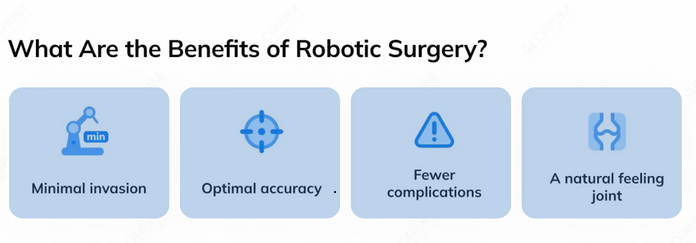
Use case: The startup Proximie has developed a platform that integrates Augmented Reality (AR) and Artificial Intelligence (AI) to facilitate remote collaboration between surgeons and surgical teams on-site. This innovative technology enables experts to offer live guidance for procedures, regardless of their geographical location. Through the use of remote "hands-on" virtual assistance and video annotations during surgery, surgeons and medical teams can receive immediate guidance and support from remote specialists.
AI in Healthcare Industry: Cost of Development
The price of an AI solution can fluctuate significantly, ranging from $20,000 to $1,000,000 for a tailored system. This cost is contingent on factors such as the complexity of intelligence needed, the scale of data it must process, and the desired outcomes of the algorithms. Additionally, the prosperity of AI-focused enterprises and emerging companies will hinge on their ability to effectively promote and distribute their technologies to customers in the coming years.
RELATED: Unlocking Seamless Healthcare: How AI and Machine Learning Drive Interoperability
Summary
In the coming years, AI will revolutionize healthcare, transforming the way doctors provide patient care. AI is already enhancing efficiency, elevating medical outcomes, and ultimately aiming to increase healthcare accessibility and affordability. Realizing this vision requires continued collaboration, innovation, and an open approach as we seek to revolutionize medicine through AI-driven healthcare.
With over 25 years of experience in delivering Healthcare IT services and solutions, the KPi-Tech team is well-equipped to harness AI for your software needs. Let's stay connected and work together to reshape the future of healthcare.





